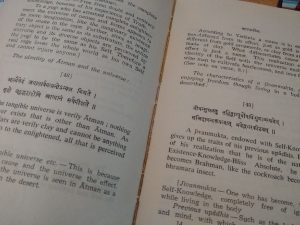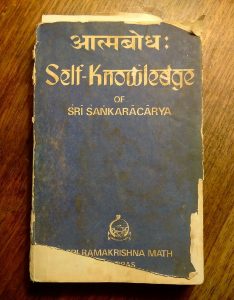Dear Yogis,
Yesterday I got so caught up in the book “SELF KNOWLEDGE” Sri Sankaracharya, I lost track of time, and I rushed the end of the message which could take weeks but won’t.
The Key is this: A liberated soul lives in the body as long as the momentum of past actions that have produced it endures. He dwells in the physical body and may experience disease, deformity, old age, decay which are the characteristics of all physical forms… He may be blind, deaf and deformed in many ways. He may feel hunger or thirst or be victim of grief or sorrow, however, he is never overwhelmed by them, understanding that they are momentary characteristics of the body, the senses and the mind. He never imagines them to be real, although he is able to enjoy the performance to his heart’s content. In the Vedas it is said: “He who sees nothing in the waking state, even as in dreamless sleep; who though beholding duality does not really behold it, since he beholds only the Absolute; who though engaged in work is really inactive – he and no other, is the knower of Self. This is the Truth.
When I was a tiny tot, I lived in the beginnings of a suburb way out in the back blocks. At the one room school, there was one “schoolyard tree” (Australian peppercorn) little or no grass, but lots of rocks and pebbles. We couldn’t build cubby or tree houses so we laid out floor plans with pebbles, and play acted games of “mothers and fathers” in these imaginary houses. They were so real to me then and now, that when I walk through my house, it is as if I was still there, in the imagination, doing and being, and having, but all in a dream. Everything seems dreamlike and not real. Nothing much has changed. I remember walking with my dad and asking “why do people want things – they aren’t real”. He didn’t understand the question, and therefore couldn’t give an answer that satisfied. I have a glimmer now, and often trip myself up. However, that being said, it is incumbent upon us that having asked and received, that we care for what we have (including the body), and when the time is right, let go – happily.
SELF KNOWLEDGE (The Vedas): Verse 48. “The Tangible universe is verily Atman; nothing whatsoever exists that is other than Atman. As pots and jars are verily clay and cannot be anything but clay, so to the enlightened, all that is perceived is the self”.
According to Vedanta a cause is non-different from its effect, just as gold is not different from gold ornaments or jewellery, or clay from articles made of clay. What differentiates cause from effect is just the name. The realisation of the identity of the Self with the universe enables a wise man to cultivate fearlessness, and love for all. The need for vigilance is imperative at every step of the spiritual life. Obstacles will be on your path at every stage until the goal is reached. The higher the aspirant reaches, the more subtle the obstacles, and the more subtle the goals.
HYMN TO THE DIVINE MOTHER FOR FORGIVENESS OF TRANSGRESSIONS: (Hymn of Shankaracarya) Verse 8.
I do not ask Thee, O Mother!
Riches, good fortune, or salvation;
I seek no happiness no knowledge.
This is my only prayer to thee:
That, as the breath of life forsake me,
Still I may chant Thy holy name.
This prayer was the last words of Ghandiji as he was assassinated one morning walking to prayer. He always said that he would give his life gladly, with his last words the name of God. And so it was. I am sure you have all heard the chant by Krishna Das “God is Real” (from the CD “Door of Faith”) which echoes and builds on Ghandi’s feelings about the Word of God/the Name of God so we all can share .
How to become free of past karma? Meditate, Meditate, Meditate. If you haven’t done it before, or find it difficult – start with 3 minutes. Not while you garden, or play golf or whatever. It is about sitting still. If you follow Ghandi’s path, he repeated a mantra all day every day and felt it was necessary for life and spiritual growth. A mala or a Red String is a good reminder.




 At the time that this books was published, Ghandi was still alive, thousands were dying due to the partition of India, Churchill although not PM was still in the Parliament, and the Queen-to-be was playing “mothers and fathers” with her fiancé Phillip funded by the public purse. This book saw it all and more.
At the time that this books was published, Ghandi was still alive, thousands were dying due to the partition of India, Churchill although not PM was still in the Parliament, and the Queen-to-be was playing “mothers and fathers” with her fiancé Phillip funded by the public purse. This book saw it all and more.